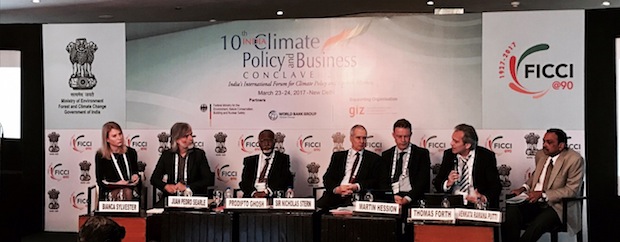
May 2017 - The 10th India Climate Policy and Business Conclave successfully brought together global policy-makers, businesses and practitioners to discuss the opportunities for climate change mitigation activities, corporate action and carbon markets in India. The event took place at the Park Hotel in New Delhi from 23-24 March 2017.
The Conclave was organised by Deutsche Gesellschaft für Internationale Zusammenarbeit (GIZ) GmbH and the Federation of Indian Chambers of Commerce & Industry (FICCI) in partnership with the Ministry of Environment, Forest and Climate Change (MoEFCC), Government of India, the German Federal Ministry for the Environment, Nature Conservation and Nuclear Safety (BMU) as well as the World Bank Group. The annual Conclave is a platform for policy dialogue, knowledge sharing on global developments, and business networking. This year’s Conclave gave an opportunity for the private sector and public stakeholders to deliberate on the Paris Agreement and the implementation of Nationally Determined Contributions (NDCs), with a focus on how India can achieve its climate targets.
In a keynote address, Sir Nicholas Stern, Chair of the Grantham Research Institute on Climate Change and Environment, London School of Economics and Political Science, stressed that in the next 15 years, emissions need to be cut down by 20% for the world to stand a chance to stay below 2 degrees Celsius – and that this would only be possible if we acknowledge the magnitude of the task. For that, Mr. Stern urged policy makers and development banks to create framework conditions attractive for businesses to invest, for instance through guarantee funds against political risks and long-term policy uncertainty. Mr. Rajani Ranjan Rashmi, Special Secretary at the Indian Ministry of Environment, Forest and Climate Change reassured the audience that India is well on track to achieve its ambitious mitigation goals and actions by 2020. He also informed the participants that the Ministry would soon release the second Biennial Update Report (BUR) in 2017. Mr Wolfgang Lahr, Embassy of the Federal Republic of Germany in India, applauded the idea of the Conclave as it would generate the much needed dialogue between different actors involved in the climate change discourse. He reaffirmed Germany’s commitment towards actively supporting countries on their journey towards low-carbon economies.
Organised back to back with the World Bank’s Partnership for Market Readiness General Assembly, the Conclave was able to attract 200 participants from 35 countries. Various plenaries discussed the current state of international climate policy, carbon markets, climate finance and climate change adaptation. Besides the plenaries, a master class on internal carbon pricing with notable industry experts gave practical guidance for decision makers. A designated CEO session allowed for in-depth impressions on how businesses interpret the climate change challenge.
Cookie Settings
Marketing-Cookies werden von Drittanbietern oder Publishern verwendet, um personalisierte Werbung anzuzeigen. Sie tun dies, indem sie Besucher über Websites hinweg verfolgen.
Provider:
Statistik Cookies
Statistik-Cookies dienen der Analyse und helfen uns dabei zu verstehen, wie Besucher mit unserer Website interagieren, indem Informationen anonymisiert gesammelt werden. Auf Basis dieser Informationen können wir unsere Website für Sie weiter verbessern und optimieren.
Provider:
Erforderliche Cookies
Erforderliche Cookies sind für den reibungslosen Betrieb der Website zuständig, indem sie Kernfunktionalitäten ermöglichen, ohne die unsere Website nicht richtig funktioniert. Diese Cookies können nur über Ihre Browser-Einstellungen deaktiviert werden.
Provider: